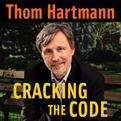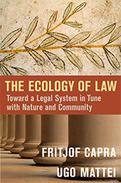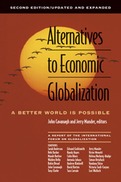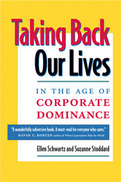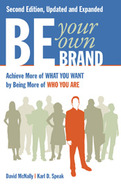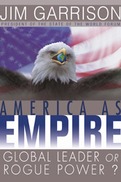Conservatives didn't intuit the path to persuasive messaging—they learned these techniques. There is no reason why progressives can't learn them too. In Cracking the Code, Hartmann shows you how. Drawing on his background as a psychotherapist and advertising executive as well as a nationally syndicated Air America radio host, he breaks down the science and technology of effective communication so you can apply it to your own efforts to counter right-wing disinformation.
As Hartmann explains, political persuasion is as much about biology as ideology, about knowing how the brain processes information and how that influences the way people perceive messages, make decisions, and form a worldview. Throughout the book, he shows you precisely how to master this technology—how to crack the communications code—providing examples dating from the time of the Founding Fathers to the present day.
2015
The Ecology of Law
Fritjof Capra and Ugo Mattei argue that at the root of many of the environmental, economic, and social crises we face today is a legal system based on an obsolete worldview. Capra, a bestselling author, physicist, and systems theorist, and Mattei, a distinguished legal scholar, explain how, by incorporating concepts from modern science, the law can become an integral part of bringing about a better world, rather than facilitating its destruction.
This is the first book to trace the fascinating parallel history of law and science from antiquity to modern times, showing how the two disciplines have always influenced each other—until recently. In the past few decades, science has shifted from seeing the natural world as a kind of cosmic machine best understood by analyzing each cog and sprocket to a systems perspective that views the world as a vast network of fluid communities and studies their dynamic interactions. The concept of ecology exemplifies this approach. But law is stuck in the old mechanistic paradigm: the world is simply a collection of discrete parts, and ownership of these parts is an individual right, protected by the state. Capra and Mattei show that this has led to overconsumption, pollution, and a general disregard on the part of the powerful for the common good.
Capra and Mattei outline the basic concepts and structures of a legal order consistent with the ecological principles that sustain life on this planet. This is a profound and visionary reconceptualization of the very foundations of the Western legal system, a kind of Copernican revolution in the law, with profound implications for the future of our planet.
This revised and expanded edition features a new opening chapter on the global balance of power, a new section on the media and globalization, and a new final chapter on what ordinary citizens can do to fight the injustices of globalization. It also includes many new charts, sidebars, and other updated information.
- The definitive document of the anti-corporate globalization movement-the consensus report of an alliance of leading activists, scholars, economists, researchers, and writers
- Offers a constructive, coherent, positive alternative to globalization-the very thing that the anti-corporate globalization movement is always accused of not putting forward
- The International Forum on Globalization consists of the leaders of over 60 organizations in 25 countries -including such prominent organizations as Friends of the Earth, the Third World Network, the Sierra Club, the Institute for Policy Studies, Public Citizen, Rainforest Action Network, and Food First
The authors use hard-hitting examples and illuminating personal vignettes about confronting fear, anger, death, family problems, and the stultifying effects of staying in the "comfort zone." They detail over 75 steps for personal and societal actions-some quick and immediate, others in-depth and long term-for retaking control of our lives. The authors include provocative questions for reflection that shock, prod, and jump-start the reader into thinking about what matters most to them.
Deeply moving, outrageous, encouraging, compelling, and inspiring, Taking Back Our Lives in the Age of Corporate Dominance blends unrelenting candor with the comfort of real-life stories of hope-and ultimately shows us that choice is the most important tool we have for reviving our lives and our world.
- Reveals the profound impact of the global corporate economy on our daily lives
- Details 75 immediate and long-term Action Steps for empowering ourselves both individually and as a society
- Offers specific tips, ideas, and resources on how to pare down our lives and open up our time
- Provides questions for reflection that help readers to think in new ways about what matters most to them
2010
-
New edition of the book that introduced the concept of personal brand as a powerful personal and professional development tool
-
Thoroughly revised and updated, with a new material on how to use social media to build a powerful personal brand and case studies of individuals whose personal brands have changed the world
-
Filled with unique and tested tools and exercises to help you develop a distinctive personal brand
You may not know it, but you have a brand. Over time, the people who interact with you -- colleagues, acquaintance, family and friends -- develop a set of perceptions of who you are what you stand for. But does your current personal brand truly reflect who you are and the difference you make? You're probably not even aware of what your brand is now, but you can consciously create one that accurately reflects your truest personal values.
Developing a personal brand is not about constructing a contrived image. Rather, it is a process of discovering who you really are and what you aspire to be, and learning how to leave the impressions that reflect your true brand. The hallmark insight of the new edition is that the best way to establish a strong and memorable brand is to make a positive difference in the lives of others. "When you make a discernable difference in the life of another," they write, "you make a lasting impression and your brand receives credit."
Be Your Own Brand shows how to create a personal brand that is distinctive, relevant to others and consistent in the way it is perceived and presented. McNally and Speak take you through the process of identifying the components of your brand, conveying that brand to the world, checking how closely your brand aligns with those of significant others -- particularly your employer -- and assessing your progress along the way. The plethora of tested tools and exercises they provide make the experience easy, enlightening, and enjoyable.
2004
Garrison traces the roots of the American empire to the very beginnings of the republic, in particular to the historic willingness of United States' to use military might in the defense of two consistent --- if sometimes contradictory --- foreign policy objectives: protection of American commercial interests and promotion of democracy.
How long can the American empire last? Garrison looks at American history within the context of the rise and fall of empires and argues that the U. S. can gain important insights into durability from the Romans. He details the interplay between military power, political institutions, and legal structures that enabled the Roman empire at it's apogee to last for longer than America has as a country.
But the real question is, what kind of empire can and should America be? As the sole superpower, America must lead in shaping a new global order, just as after World War II Roosevelt and Truman took the lead in shaping a new international order. That international order is now crumbling under the pressures of globalization, persistent poverty, terrorism and fundamentalism. Garrison outlines the kinds of cooperative global structures America must promote if its empire is to leave a lasting legacy of greatness. Garrison calls for Americans to consciously see themselves as a transitional empire, one whose task is not to dominate but to catalyze the next generation of global governance mechanisms that would make obsolete the need for empire. If this is done, America could be the final empire.
-
Asserts that America has already made the transition from republic to empire
-
Asks what kind of empire America can and should be, suggesting that America should consciously see itself as a new kind of empire, one that will work to make the notion of empire obsolete
-
Written by the President of the State of the World Forum, a global network whose members include such distinguished figures as Mikhail Gorbachev, Oscar Arias, George Schultz, Jane Goodall, and Elie Weisel


